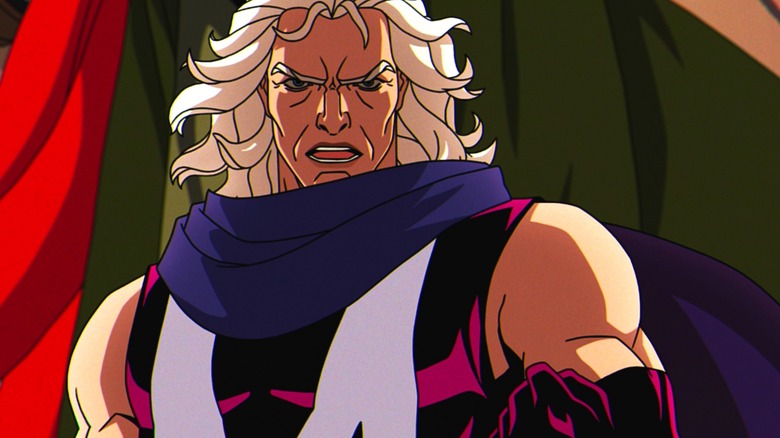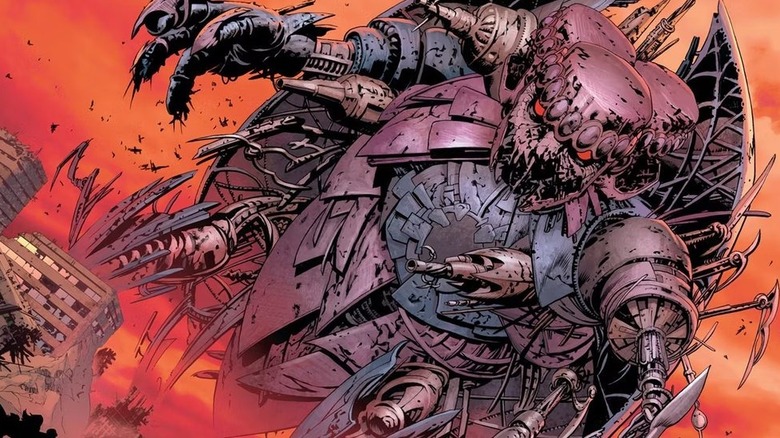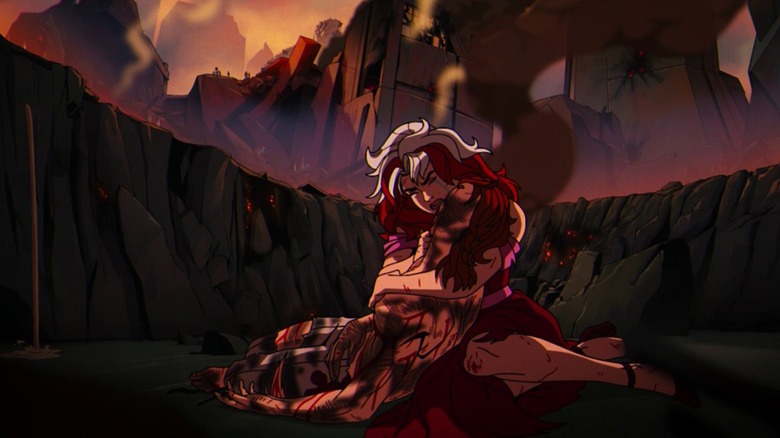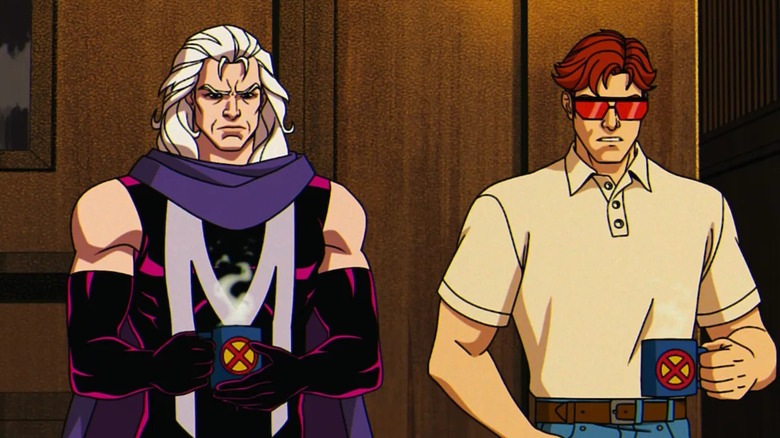X-Men '97 Just Adapted One Of The Darkest Marvel Storylines Ever
Spoilers for "X-Men '97" to follow.
Well, the first season of "X-Men '97" just swerved hard — but if you're familiar with the comics, you may have seen this coming.
In previous episodes, it seemed like human-mutant relations were slowly improving; Magneto turned over a new leaf, talking human authorities into giving him a second chance in the process, while Genosha was joining the United Nations. As established in the original "X-Men" animated series, Genosha is an island nation that once used enslaved mutants; mutants have since taken it over and turned it into a country for themselves. Statues of Magneto and Professor X adorn the land, twin monuments to the competing mutant messiahs.
In episode 5, "Remember It," the new love triangle of Rogue, Gambit, and Magneto flies to Genosha to get a firsthand look, meeting several familiar faces in a thriving mutant refuge. It's not long for this world; at a gala the following night, an enormous Sentinel attacks Genosha. The sound of celebratory fireworks is drowned out as the Sentinel firebombs the country and kills countless mutants.
Yes, unfortunately, the Sentinels' appearance in episode 1 "To Me, My X-Men" wasn't just to reintroduce the X-Men fighting some disposable (and nostalgic) robot foes. Madelyne Pryor's psychic vision in that episode, of a Sentinel's skeletal head emerging from a mutant graveyard, now looks like a premonition of the Genosha massacre rather than a forestalled threat.
Tragically, this was exactly the fate that befell Genosha in the comics, specifically "E is for Extinction," the opening arc of Grant Morrison's run on "New X-Men" (illustrated by Frank Quitely). Professor X's evil twin sister Cassandra Nova hijacks an enormous Sentinel and lets it loose on Genosha, razing the island's city and killing nearly all of the 16 million mutants who lived there.
X-Men: E is For Extinction
Morrison's run emphasized a break from the calcified norms of "X-Men" comics and the destruction of Genosha (in only its second issue, "New X-Men" #115) was a statement of intent. It took almost two decades of comics (and some magic by the Scarlet Witch) for the mutant population to recover from Genosha.
"X-Men '97" exploits its TV-14 rating (compared to the original's TV-Y). Mutants are incinerated onscreen and Gambit is brutally stabbed before he uses his powers to destroy the Sentinel. If anything, the destruction is more terrifying and drawn-out than in "New X-Men," though it is no less sudden for the victims.
The episode doesn't reveal who is behind the attack, but the show has already given us plenty of racist human villains, from Sentinel creators Henry Gyrich and Bolivar Trask to the hate group the Friends of Humanity. It could be Cassandra Nova, but a genocide carried out by humanity's hatred feels more in line with what "X-Men '97" has built up. This goes back to the original series season 1 finale, adapted from the comic "Days of Future Past," where Sentinels have wiped out mutants in a "Terminator"-like future.
Former "X-Men '97" showrunner Beau DeMayo was fired rather suddenly before the show premiered. I don't know what did or didn't happen, but I have to admit, I've been pretty impressed by his work on the series. On Twitter, he compared the slaughter of Genosha to the real-life destruction of "Black Wall Street" in Tulsa, Oklahoma in 1921; African-Americans built a prosperous town that was destroyed (and its inhabitants slaughtered) by white racists. Bigots see the world in zero sums; if a minority group succeeds, then they'll become the oppressors and the empowered can't have that.
The X-Men, feared and hunted
The idea of a mutant homeland, and how humans can't allow it to exist, is one that's been explored in "X-Men" comics outside of Genosha. The most recent era of "X-Men" featured all the mutants of the world (even the bad guys like Mister Sinister and Apocalypse) moving to the living island of Krakoa and setting up an eponymous country. One comparison is that while Genosha is a mutant Haiti (an enslaved population revolted and made a nation their own), Krakoa is a mutant Israel (minus the whole displacing an indigenous population aspect of Zionism).
While Genosha was content to be one nation among many, Krakoa initiated more of a hostile takeover. The X-Men implanted seeds across the globe that created mutant-only portals to Krakoa. Krakoa's Hellfire Industries bought the country's diplomatic relations by inventing life-saving drugs (while using the proceeds to buy up soft power). The mutants were operating with the mindset that they would soon displace humanity via evolution and Magneto warned the world they had "New Gods now."
So, of course, humankind couldn't let that stand and the terrorist group Orchis (relying again on AI to curb mutants) invaded Krakoa. The destruction of Genosha in "X-Men '97" just as much resembles the invasion of Krakoa in the 2023 "X-Men: Hellfire Gala" comic (mostly the attack happening in the middle of a party).
As for "X-Men '97" — Magneto is trying to leave behind his terrorist past. In episode 2, he warned the United Nations: "I am trying to be better. Please, do not make me let you down." Well, they've just given him that reason and proven his meager demand that mutants be allowed to live was too much.
Is this the end for Magneto the hero?
Genosha was Magneto's dream; a place where mutants can live and thrive among each other without any threat of discrimination. He sometimes talks of conquest and war with humanity, sure, but only as a means to an end. In the original "X-Men" animated series two-parter "Sanctuary," he built an off-world mutant colony called Asteroid M; Magneto's peaceful mission of separatism only turned violent because his Acolyte Fabian Cortez betrayed him and tried to start a war.
As Rogue notes in "Remember It," Magneto has plans for a whole mutant culture (he paints Rogue's portrait, using his powers to wield multiple brushes at once). Magneto himself compares his dream of mutant prosperity to Moses being denied a place in the promised land (another nice touch of "X-Men '97" emphasizing Magneto's Jewishness), but Genosha made the dream a reality. Magneto's fate is currently unclear, but I'll be shocked if he's truly dead. During the Genoshan genocide, Magneto has flashbacks of his childhood surviving the Holocaust. Will his new anger that his people have again been slaughtered be too much to contain?
In Morrison's "New X-Men," one of the few survivors of Genosha was Emma Frost, thanks to her new ability to make her skin unbreakable like a diamond. After that, she joins the X-Men, wanting to help their students after she failed to protect hers. Emma is part of the Genosha ruling council in "Remember It" — could we see her get a larger role and become a hero like in the comics, too?
The next episode of "X-Men '97" will pick up with Storm and Forge for "Lifedeath — Part 2," so the wait will be long and agonizing.
"X-Men '97" is streaming on Disney+.



